| What to expect in daily life: Keep a JournalWhether going through treatment, newly diagnosed or not yet diagnosed keeping a journal and if possible taking video or pictures of their daily life will help you and your vet/neurologist a lot. It gives them a window into daily life and the severity of the patients illness. It can show deterioration or improvement. A journal can describe symptoms to your doctor that were not displayed by your pet while at the clinic. There will be good days and bad days Some days you will be amazed by your Hydrocephalus pet and other days they will need extra help, not every day is the same. Make your home Hydrocephalus friendly Seizures and blindness can make your home and the outdoors a dangerous place. It will be harder for pets with circling and problems with balance to make their way around a house or yard. Keep things out of their reach that can be hazardous, sharp, breakable, electrical, or things they can get stuck in. Things like thorny rose bushes, holes in fencing and even gaps between washers/dryers or furniture can be dangerous. Don't limit them, but protect them Let them be free to run, play and enjoy life but always watch them. Never leave a dog with Hydrocephalus left unattended outside of a safe, confined space. Leaving them in the yard or loose in the house when your not home or asleep is not a good idea. Kenneling or containing to a laundry room, etc will keep them safe when your not home. Interaction with other animalsMonitor this carefully! The animal kingdom is not politically correct, they sense weakness and differences. Many dogs and cats will treat differently, pick on or hurt animals with Hydrocephalus. This goes for their littermates and parents as well. Also, sometimes a hydrocephalus pets immune system is low and interaction with other animals not in good health is a bad idea. Keep animals with kennel cough, ringworm, and other communicable illnesses/diseases away from your Hydrocephalus pet. Make sure your pet is up to date on all possible vaccinations. Handle with care and kindnessDon't hit, harshly disciple or yell at them. Trying to train and teach them like a normal dog is a waste of time. House training and learning basic commands will not come easy to them and in some severe cases may never happen. When approaching them, say hello and let them listen to your approach if they are blind. Walking up fast and scooping them up can be scary for them. Interaction with PeopleSocializing animals is important - but do so with caution. Pets like people, are not always up for company or meeting people. The best thing to do when you have company is to put them in their safe place (kennel, laundry room, etc). Children should not handle them unless mature enough to understand their condition, are gentle and are supervised. Basic Vet careBasic vet care like vaccinations, heartworm testing, flea/heartworm meds and microchipping can and should be done just the same as in a normal dog. Shots and anything painful can cause confusion for them and sometimes aggression. Tell your vet and their staff about your pets condition. If they are aggressive/bite when scared, hurt or confused, it may be necessary to muzzle when going in public or while receiving shots, etc. *Spay and neuter is very important. A pet with Hydrocephalus should not be bred. Talk to your doctor about spay/neuter for your Hydrocephalus pet to avoid a future problem.
|
What to expect - Daily Life
Subscribe to:
Comments (Atom)




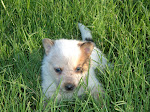
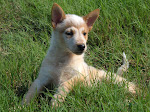
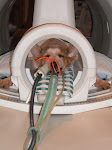
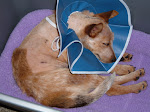

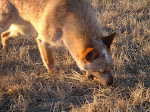





No comments:
Post a Comment